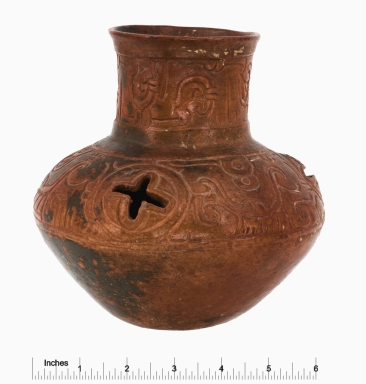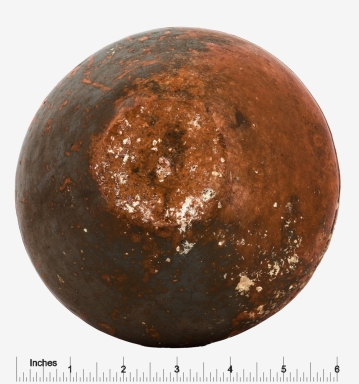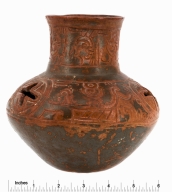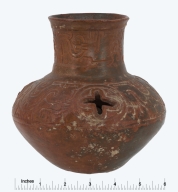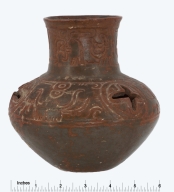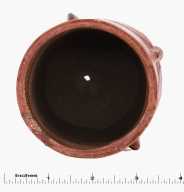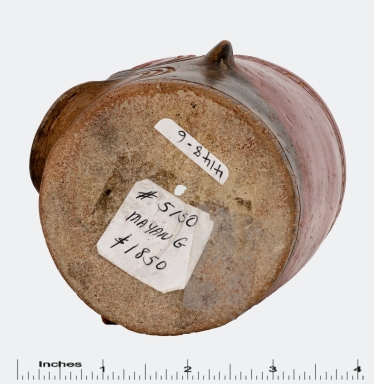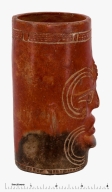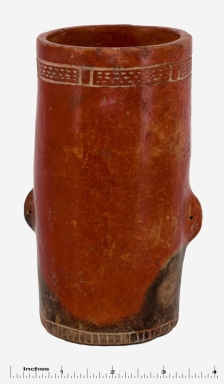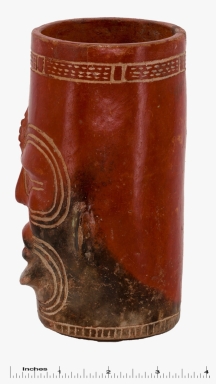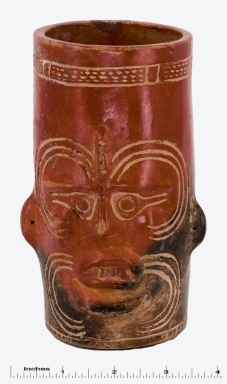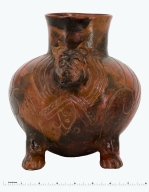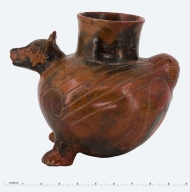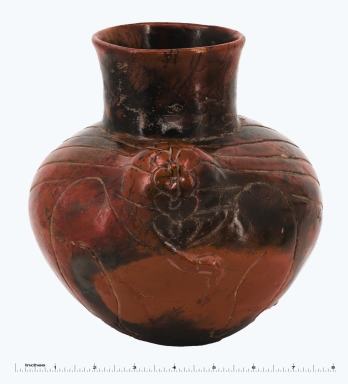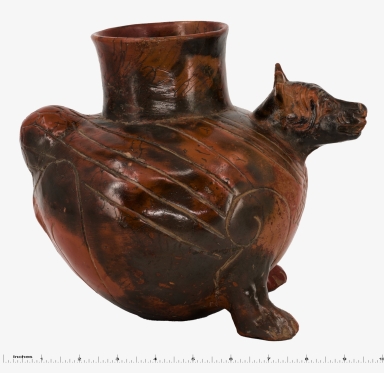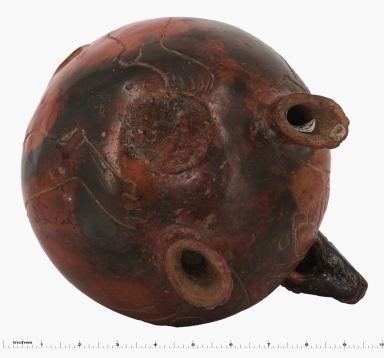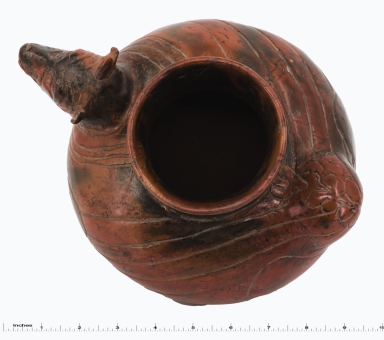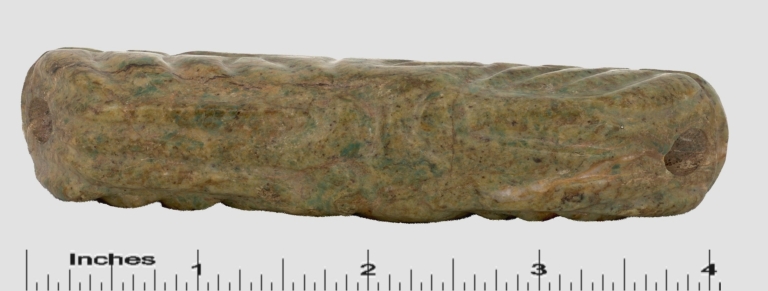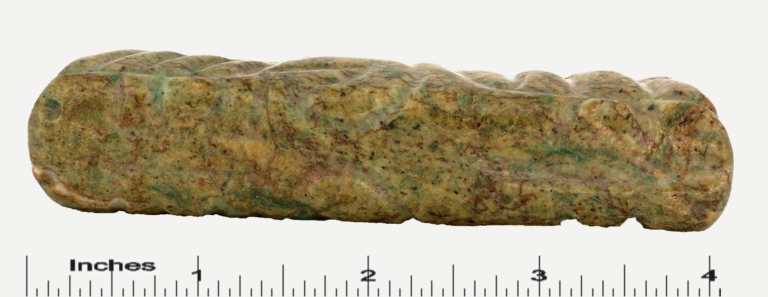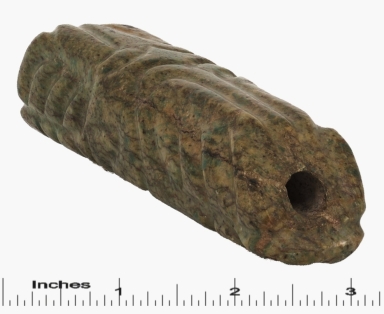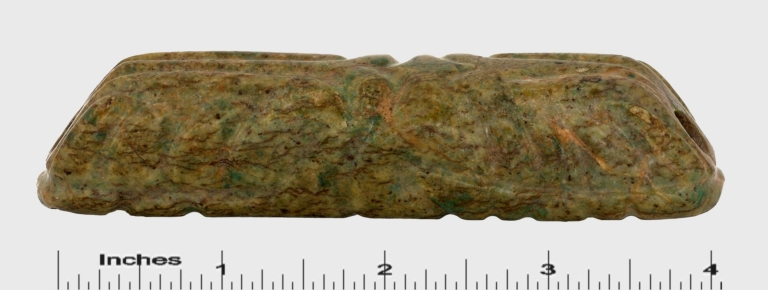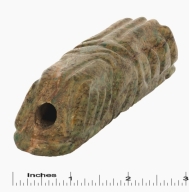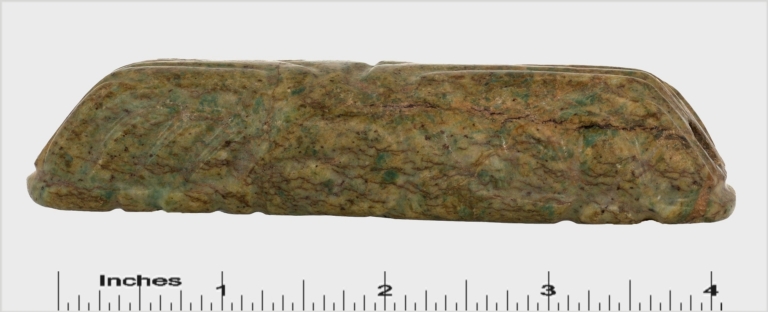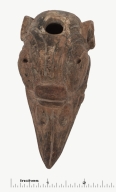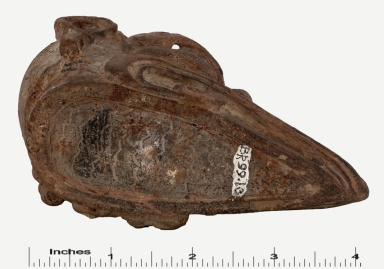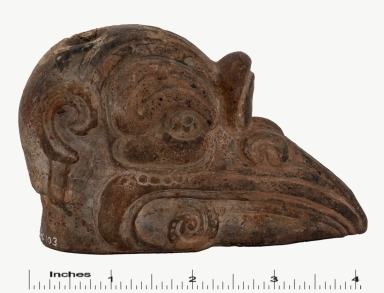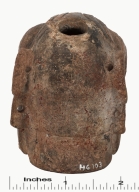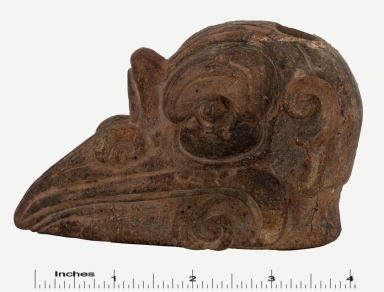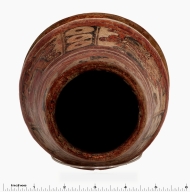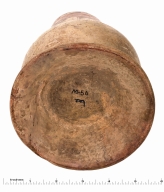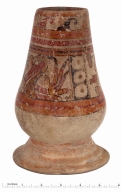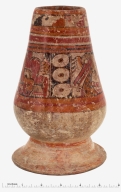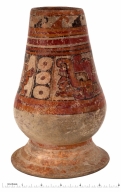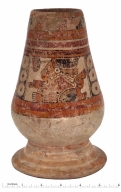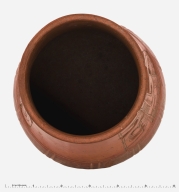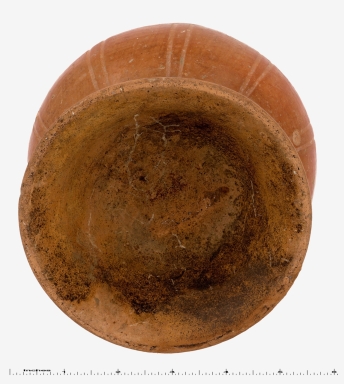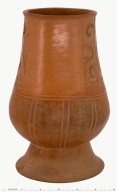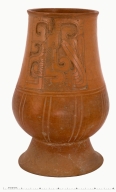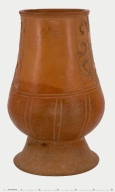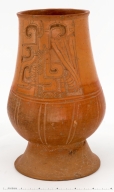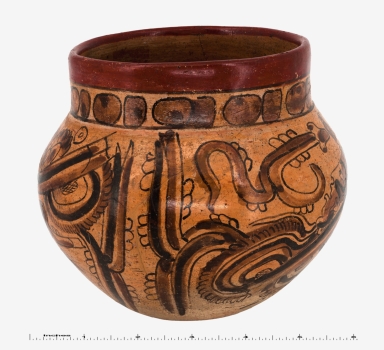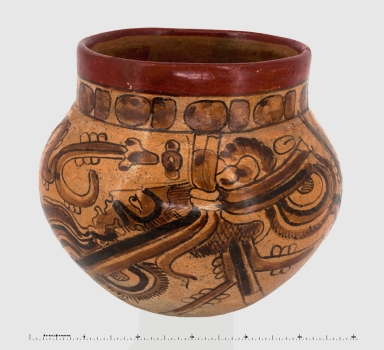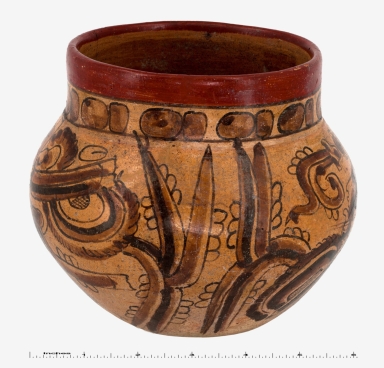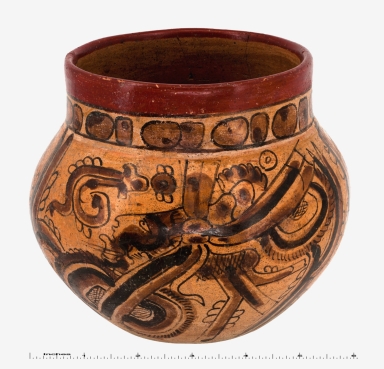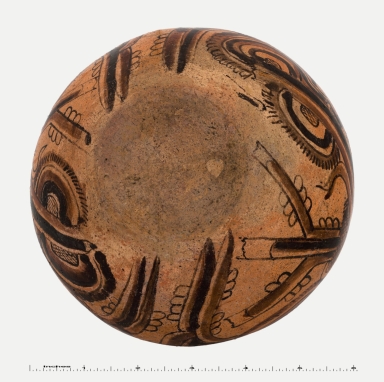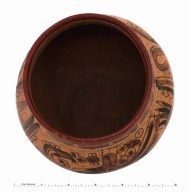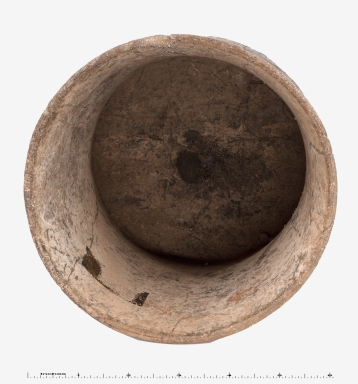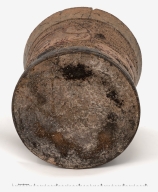Who What Where WhenREMOVEWHATShow MoreWHO
|
Title
Maya plumbate olla : rattle.
Description
This unusual plumbate cacao vessel is divided into three quadrants. Each quadrant contains an elaborate design of semi-abstract faces and zoomorphic (supernatural entities) on the vessel's neckband and wide shoulder band. Between each quadrant, the Maya "kin" crosses hold a ceramic sphere to create a rattling sound.
Subject
[Pottery--Mexico--Chiapas, Ceramic tableware--Mexico--Chiapas, Drinking vessels--Mexico--Chiapas, Maya art--Mexico--Chiapas, Mayas--Antiquities, Indigenous peoples--Antiquities]
Date
between 900 and 1250
Title
Maya plumbate olla : rattle.
Description
This unusual plumbate cacao vessel is divided into three quadrants. Each quadrant contains an elaborate design of semi-abstract faces and zoomorphic (supernatural entities) on the vessel's neckband and wide shoulder band. Between each quadrant, the Maya "kin" crosses hold a ceramic sphere to create a rattling sound.
Subject
[Pottery--Mexico--Chiapas, Ceramic tableware--Mexico--Chiapas, Drinking vessels--Mexico--Chiapas, Maya art--Mexico--Chiapas, Mayas--Antiquities, Indigenous peoples--Antiquities]
Date
between 900 and 1250
Title
Maya plumbate olla : rattle.
Description
This unusual plumbate cacao vessel is divided into three quadrants. Each quadrant contains an elaborate design of semi-abstract faces and zoomorphic (supernatural entities) on the vessel's neckband and wide shoulder band. Between each quadrant, the Maya "kin" crosses hold a ceramic sphere to create a rattling sound.
Subject
[Pottery--Mexico--Chiapas, Ceramic tableware--Mexico--Chiapas, Drinking vessels--Mexico--Chiapas, Maya art--Mexico--Chiapas, Mayas--Antiquities, Indigenous peoples--Antiquities]
Date
between 900 and 1250
Title
Maya plumbate olla : rattle.
Description
This unusual plumbate cacao vessel is divided into three quadrants. Each quadrant contains an elaborate design of semi-abstract faces and zoomorphic (supernatural entities) on the vessel's neckband and wide shoulder band. Between each quadrant, the Maya "kin" crosses hold a ceramic sphere to create a rattling sound.
Subject
[Pottery--Mexico--Chiapas, Ceramic tableware--Mexico--Chiapas, Drinking vessels--Mexico--Chiapas, Maya art--Mexico--Chiapas, Mayas--Antiquities, Indigenous peoples--Antiquities]
Date
between 900 and 1250
Title
Maya plumbate olla : rattle.
Description
This unusual plumbate cacao vessel is divided into three quadrants. Each quadrant contains an elaborate design of semi-abstract faces and zoomorphic (supernatural entities) on the vessel's neckband and wide shoulder band. Between each quadrant, the Maya "kin" crosses hold a ceramic sphere to create a rattling sound.
Subject
[Pottery--Mexico--Chiapas, Ceramic tableware--Mexico--Chiapas, Drinking vessels--Mexico--Chiapas, Maya art--Mexico--Chiapas, Mayas--Antiquities, Indigenous peoples--Antiquities]
Date
between 900 and 1250
Title
Maya plumbate olla : rattle.
Description
This unusual plumbate cacao vessel is divided into three quadrants. Each quadrant contains an elaborate design of semi-abstract faces and zoomorphic (supernatural entities) on the vessel's neckband and wide shoulder band. Between each quadrant, the Maya "kin" crosses hold a ceramic sphere to create a rattling sound.
Subject
[Pottery--Mexico--Chiapas, Ceramic tableware--Mexico--Chiapas, Drinking vessels--Mexico--Chiapas, Maya art--Mexico--Chiapas, Mayas--Antiquities, Indigenous peoples--Antiquities]
Date
between 900 and 1250
Title
Orangeware effigy vessel : deity Simian.
Description
A small appliqued cylinder with an anthropomorphic face and a fanged mouth, whiskers incised on the brow, and around the fanged mouth suggests a deity.
Subject
[Effigy pottery--Central America, Ceramic tableware--Central America, Drinking vessels--Central America, Maya art--Central America, Mayas--Antiquities, Indigenous peoples--Antiquities]
Date
between 500 and 800
Title
Orangeware effigy vessel : deity Simian.
Description
A small appliqued cylinder with an anthropomorphic face and a fanged mouth, whiskers incised on the brow, and around the fanged mouth suggests a deity.
Subject
[Effigy pottery--Central America, Ceramic tableware--Central America, Drinking vessels--Central America, Maya art--Central America, Mayas--Antiquities, Indigenous peoples--Antiquities]
Date
between 500 and 800
Title
Orangeware effigy vessel : deity Simian.
Description
A small appliqued cylinder with an anthropomorphic face and a fanged mouth, whiskers incised on the brow, and around the fanged mouth suggests a deity.
Subject
[Effigy pottery--Central America, Ceramic tableware--Central America, Drinking vessels--Central America, Maya art--Central America, Mayas--Antiquities, Indigenous peoples--Antiquities]
Date
between 500 and 800
Title
Orangeware effigy vessel : deity Simian.
Description
A small appliqued cylinder with an anthropomorphic face and a fanged mouth, whiskers incised on the brow, and around the fanged mouth suggests a deity.
Subject
[Effigy pottery--Central America, Ceramic tableware--Central America, Drinking vessels--Central America, Maya art--Central America, Mayas--Antiquities, Indigenous peoples--Antiquities]
Date
between 500 and 800
Title
Orangeware effigy vessel : deity Simian.
Description
A small appliqued cylinder with an anthropomorphic face and a fanged mouth, whiskers incised on the brow, and around the fanged mouth suggests a deity.
Subject
[Effigy pottery--Central America, Ceramic tableware--Central America, Drinking vessels--Central America, Maya art--Central America, Mayas--Antiquities, Indigenous peoples--Antiquities]
Date
between 500 and 800
Title
Orangeware effigy vessel : deity Simian.
Description
A small appliqued cylinder with an anthropomorphic face and a fanged mouth, whiskers incised on the brow, and around the fanged mouth suggests a deity.
Subject
[Effigy pottery--Central America, Ceramic tableware--Central America, Drinking vessels--Central America, Maya art--Central America, Mayas--Antiquities, Indigenous peoples--Antiquities]
Date
between 500 and 800
Title
Vessel in the form of a dog, Esquintla.
Description
The Maya domesticated their dogs for household pets and hunting animals. They were raised for food, a heat source (hot water bottle) and sacrificial animal. The god Quetzalcoatl or Feathered Serpent's twin brother was called Xolotl. He was believed to help guide souls through Xibalba or the underworld. The esquintla wears an Aztec heart amulet around his neck.
Subject
[Pottery--Guatemala, Ceramic tableware--Guatemala, Drinking vessels--Guatemala, Maya art--Guatemala, Mayas--Antiquities, Indigenous peoples--Antiquities]
Date
between 900 and 1100
Title
Vessel in the form of a dog, Esquintla.
Description
The Maya domesticated their dogs for household pets and hunting animals. They were raised for food, a heat source (hot water bottle) and sacrificial animal. The god Quetzalcoatl or Feathered Serpent's twin brother was called Xolotl. He was believed to help guide souls through Xibalba or the underworld. The esquintla wears an Aztec heart amulet around his neck.
Subject
[Pottery--Guatemala, Ceramic tableware--Guatemala, Drinking vessels--Guatemala, Maya art--Guatemala, Mayas--Antiquities, Indigenous peoples--Antiquities]
Date
between 900 and 1100
Title
Vessel in the form of a dog, Esquintla.
Description
The Maya domesticated their dogs for household pets and hunting animals. They were raised for food, a heat source (hot water bottle) and sacrificial animal. The god Quetzalcoatl or Feathered Serpent's twin brother was called Xolotl. He was believed to help guide souls through Xibalba or the underworld. The esquintla wears an Aztec heart amulet around his neck.
Subject
[Pottery--Guatemala, Ceramic tableware--Guatemala, Drinking vessels--Guatemala, Maya art--Guatemala, Mayas--Antiquities, Indigenous peoples--Antiquities]
Date
between 900 and 1100
Title
Vessel in the form of a dog, Esquintla.
Description
The Maya domesticated their dogs for household pets and hunting animals. They were raised for food, a heat source (hot water bottle) and sacrificial animal. The god Quetzalcoatl or Feathered Serpent's twin brother was called Xolotl. He was believed to help guide souls through Xibalba or the underworld. The esquintla wears an Aztec heart amulet around his neck.
Subject
[Pottery--Guatemala, Ceramic tableware--Guatemala, Drinking vessels--Guatemala, Maya art--Guatemala, Mayas--Antiquities, Indigenous peoples--Antiquities]
Date
between 900 and 1100
Title
Vessel in the form of a dog, Esquintla.
Description
The Maya domesticated their dogs for household pets and hunting animals. They were raised for food, a heat source (hot water bottle) and sacrificial animal. The god Quetzalcoatl or Feathered Serpent's twin brother was called Xolotl. He was believed to help guide souls through Xibalba or the underworld. The esquintla wears an Aztec heart amulet around his neck.
Subject
[Pottery--Guatemala, Ceramic tableware--Guatemala, Drinking vessels--Guatemala, Maya art--Guatemala, Mayas--Antiquities, Indigenous peoples--Antiquities]
Date
between 900 and 1100
Title
Vessel in the form of a dog, Esquintla.
Description
The Maya domesticated their dogs for household pets and hunting animals. They were raised for food, a heat source (hot water bottle) and sacrificial animal. The god Quetzalcoatl or Feathered Serpent's twin brother was called Xolotl. He was believed to help guide souls through Xibalba or the underworld. The esquintla wears an Aztec heart amulet around his neck.
Subject
[Pottery--Guatemala, Ceramic tableware--Guatemala, Drinking vessels--Guatemala, Maya art--Guatemala, Mayas--Antiquities, Indigenous peoples--Antiquities]
Date
between 900 and 1100
Title
Mayan jade bead : double headed Saurian.
Description
Saurians are very important symbolically to ancient Americans. Various reptiles represent the earth's surface, transformation, and regeneration. The double headed saurian bead probably was the center piece of an elite necklace.
Subject
[Beads--Guatemala, Jewelry--Guatemala, Stone carving--Guatemala, Maya art--Guatemala, Mayas--Antiquities, Indigenous peoples--Antiquities]
Date
between 250 and 900
Title
Mayan jade bead : double headed Saurian.
Description
Saurians are very important symbolically to ancient Americans. Various reptiles represent the earth's surface, transformation, and regeneration. The double headed saurian bead probably was the center piece of an elite necklace.
Subject
[Beads--Guatemala, Jewelry--Guatemala, Stone carving--Guatemala, Maya art--Guatemala, Mayas--Antiquities, Indigenous peoples--Antiquities]
Date
between 250 and 900
Title
Mayan jade bead : double headed Saurian.
Description
Saurians are very important symbolically to ancient Americans. Various reptiles represent the earth's surface, transformation, and regeneration. The double headed saurian bead probably was the center piece of an elite necklace.
Subject
[Beads--Guatemala, Jewelry--Guatemala, Stone carving--Guatemala, Maya art--Guatemala, Mayas--Antiquities, Indigenous peoples--Antiquities]
Date
between 250 and 900
Title
Mayan jade bead : double headed Saurian.
Description
Saurians are very important symbolically to ancient Americans. Various reptiles represent the earth's surface, transformation, and regeneration. The double headed saurian bead probably was the center piece of an elite necklace.
Subject
[Beads--Guatemala, Jewelry--Guatemala, Stone carving--Guatemala, Maya art--Guatemala, Mayas--Antiquities, Indigenous peoples--Antiquities]
Date
between 250 and 900
Title
Mayan jade bead : double headed Saurian.
Description
Saurians are very important symbolically to ancient Americans. Various reptiles represent the earth's surface, transformation, and regeneration. The double headed saurian bead probably was the center piece of an elite necklace.
Subject
[Beads--Guatemala, Jewelry--Guatemala, Stone carving--Guatemala, Maya art--Guatemala, Mayas--Antiquities, Indigenous peoples--Antiquities]
Date
between 250 and 900
Title
Mayan jade bead : double headed Saurian.
Description
Saurians are very important symbolically to ancient Americans. Various reptiles represent the earth's surface, transformation, and regeneration. The double headed saurian bead probably was the center piece of an elite necklace.
Subject
[Beads--Guatemala, Jewelry--Guatemala, Stone carving--Guatemala, Maya art--Guatemala, Mayas--Antiquities, Indigenous peoples--Antiquities]
Date
between 250 and 900
Title
Maya avian head poison bottle.
Description
A rare earthenware bottle depicting a stylized avian deity's head having a large slightly curved beak, large lidded eyes, curled fangs, and human type ears. The drilled perforations in his ears and at the top of the eyes probably once held decorative elements.
Subject
[Pottery--Central America, Ceramic tableware--Central America, Maya art--Central America, Mayas--Antiquities, Indigenous peoples--Antiquities]
Date
between 500 and 800
Title
Maya avian head poison bottle.
Description
A rare earthenware bottle depicting a stylized avian deity's head having a large slightly curved beak, large lidded eyes, curled fangs, and human type ears. The drilled perforations in his ears and at the top of the eyes probably once held decorative elements.
Subject
[Pottery--Central America, Ceramic tableware--Central America, Maya art--Central America, Mayas--Antiquities, Indigenous peoples--Antiquities]
Date
between 500 and 800
Title
Maya avian head poison bottle.
Description
A rare earthenware bottle depicting a stylized avian deity's head having a large slightly curved beak, large lidded eyes, curled fangs, and human type ears. The drilled perforations in his ears and at the top of the eyes probably once held decorative elements.
Subject
[Pottery--Central America, Ceramic tableware--Central America, Maya art--Central America, Mayas--Antiquities, Indigenous peoples--Antiquities]
Date
between 500 and 800
Title
Maya avian head poison bottle.
Description
A rare earthenware bottle depicting a stylized avian deity's head having a large slightly curved beak, large lidded eyes, curled fangs, and human type ears. The drilled perforations in his ears and at the top of the eyes probably once held decorative elements.
Subject
[Pottery--Central America, Ceramic tableware--Central America, Maya art--Central America, Mayas--Antiquities, Indigenous peoples--Antiquities]
Date
between 500 and 800
Title
Maya avian head poison bottle.
Description
A rare earthenware bottle depicting a stylized avian deity's head having a large slightly curved beak, large lidded eyes, curled fangs, and human type ears. The drilled perforations in his ears and at the top of the eyes probably once held decorative elements.
Subject
[Pottery--Central America, Ceramic tableware--Central America, Maya art--Central America, Mayas--Antiquities, Indigenous peoples--Antiquities]
Date
between 500 and 800
Title
Maya avian head poison bottle.
Description
A rare earthenware bottle depicting a stylized avian deity's head having a large slightly curved beak, large lidded eyes, curled fangs, and human type ears. The drilled perforations in his ears and at the top of the eyes probably once held decorative elements.
Subject
[Pottery--Central America, Ceramic tableware--Central America, Maya art--Central America, Mayas--Antiquities, Indigenous peoples--Antiquities]
Date
between 500 and 800
Title
Maya baluster form vase : three pictoral panels : cormorant, elite Maya male, quetzalcoatl with ancestor.
Description
This transitional ceramic depicts Maya iconography on a foreign vessel. The baluster form with a pedestal foot is a Costa Rican import. The polychrome decorations of a cormorant with jaguar spots, a seated maya, and a feathered serpent with an ancestor emerging from the serpent's mouth are Maya.
Subject
[Vases, Ancient--El Salvador, Pottery--El Salvador, Ceramic tableware--El Salvador, Maya art--El Salvador, Mayas--Antiquities, Indigenous peoples--Antiquities]
Date
between 500 and 800
Title
Maya baluster form vase : three pictoral panels : cormorant, elite Maya male, quetzalcoatl with ancestor.
Description
This transitional ceramic depicts Maya iconography on a foreign vessel. The baluster form with a pedestal foot is a Costa Rican import. The polychrome decorations of a cormorant with jaguar spots, a seated maya, and a feathered serpent with an ancestor emerging from the serpent's mouth are Maya.
Subject
[Vases, Ancient--El Salvador, Pottery--El Salvador, Ceramic tableware--El Salvador, Maya art--El Salvador, Mayas--Antiquities, Indigenous peoples--Antiquities]
Date
between 500 and 800
Title
Maya baluster form vase : three pictoral panels : cormorant, elite Maya male, quetzalcoatl with ancestor.
Description
This transitional ceramic depicts Maya iconography on a foreign vessel. The baluster form with a pedestal foot is a Costa Rican import. The polychrome decorations of a cormorant with jaguar spots, a seated maya, and a feathered serpent with an ancestor emerging from the serpent's mouth are Maya.
Subject
[Vases, Ancient--El Salvador, Pottery--El Salvador, Ceramic tableware--El Salvador, Maya art--El Salvador, Mayas--Antiquities, Indigenous peoples--Antiquities]
Date
between 500 and 800
Title
Maya baluster form vase : three pictoral panels : cormorant, elite Maya male, quetzalcoatl with ancestor.
Description
This transitional ceramic depicts Maya iconography on a foreign vessel. The baluster form with a pedestal foot is a Costa Rican import. The polychrome decorations of a cormorant with jaguar spots, a seated maya, and a feathered serpent with an ancestor emerging from the serpent's mouth are Maya.
Subject
[Vases, Ancient--El Salvador, Pottery--El Salvador, Ceramic tableware--El Salvador, Maya art--El Salvador, Mayas--Antiquities, Indigenous peoples--Antiquities]
Date
between 500 and 800
Title
Maya baluster form vase : three pictoral panels : cormorant, elite Maya male, quetzalcoatl with ancestor.
Description
This transitional ceramic depicts Maya iconography on a foreign vessel. The baluster form with a pedestal foot is a Costa Rican import. The polychrome decorations of a cormorant with jaguar spots, a seated maya, and a feathered serpent with an ancestor emerging from the serpent's mouth are Maya.
Subject
[Vases, Ancient--El Salvador, Pottery--El Salvador, Ceramic tableware--El Salvador, Maya art--El Salvador, Mayas--Antiquities, Indigenous peoples--Antiquities]
Date
between 500 and 800
Title
Maya baluster form vase : three pictoral panels : cormorant, elite Maya male, quetzalcoatl with ancestor.
Description
This transitional ceramic depicts Maya iconography on a foreign vessel. The baluster form with a pedestal foot is a Costa Rican import. The polychrome decorations of a cormorant with jaguar spots, a seated maya, and a feathered serpent with an ancestor emerging from the serpent's mouth are Maya.
Subject
[Vases, Ancient--El Salvador, Pottery--El Salvador, Ceramic tableware--El Salvador, Maya art--El Salvador, Mayas--Antiquities, Indigenous peoples--Antiquities]
Date
between 500 and 800
Title
Maya orangeware carved vase.
Description
During the late Classic period, Nicaraguan, Costa Rican, and Panamanian ceramic styles influenced Mesoamerica. The baluster vase with a pedestal foot was a Costa Rican import. The carved abstract design of a feathered serpent, Quetzalcoatl, is pure Mesoamerican.
Subject
[Vases--Mexico--Puebla de Zaragoza, Pottery--Mexico--Puebla de Zaragoza, Ceramic sculpture--Mexico--Puebla de Zaragoza, Maya art--Mexico--Puebla de Zaragoza, Mayas--Antiquities, Indigenous peoples--Antiquities]
Date
between 800 and 1000
Title
Maya orangeware carved vase.
Description
During the late Classic period, Nicaraguan, Costa Rican, and Panamanian ceramic styles influenced Mesoamerica. The baluster vase with a pedestal foot was a Costa Rican import. The carved abstract design of a feathered serpent, Quetzalcoatl, is pure Mesoamerican.
Subject
[Vases--Mexico--Puebla de Zaragoza, Pottery--Mexico--Puebla de Zaragoza, Ceramic sculpture--Mexico--Puebla de Zaragoza, Maya art--Mexico--Puebla de Zaragoza, Mayas--Antiquities, Indigenous peoples--Antiquities]
Date
between 800 and 1000
Title
Maya orangeware carved vase.
Description
During the late Classic period, Nicaraguan, Costa Rican, and Panamanian ceramic styles influenced Mesoamerica. The baluster vase with a pedestal foot was a Costa Rican import. The carved abstract design of a feathered serpent, Quetzalcoatl, is pure Mesoamerican.
Subject
[Vases--Mexico--Puebla de Zaragoza, Pottery--Mexico--Puebla de Zaragoza, Ceramic sculpture--Mexico--Puebla de Zaragoza, Maya art--Mexico--Puebla de Zaragoza, Mayas--Antiquities, Indigenous peoples--Antiquities]
Date
between 800 and 1000
Title
Maya orangeware carved vase.
Description
During the late Classic period, Nicaraguan, Costa Rican, and Panamanian ceramic styles influenced Mesoamerica. The baluster vase with a pedestal foot was a Costa Rican import. The carved abstract design of a feathered serpent, Quetzalcoatl, is pure Mesoamerican.
Subject
[Vases--Mexico--Puebla de Zaragoza, Pottery--Mexico--Puebla de Zaragoza, Ceramic sculpture--Mexico--Puebla de Zaragoza, Maya art--Mexico--Puebla de Zaragoza, Mayas--Antiquities, Indigenous peoples--Antiquities]
Date
between 800 and 1000
Title
Maya orangeware carved vase.
Description
During the late Classic period, Nicaraguan, Costa Rican, and Panamanian ceramic styles influenced Mesoamerica. The baluster vase with a pedestal foot was a Costa Rican import. The carved abstract design of a feathered serpent, Quetzalcoatl, is pure Mesoamerican.
Subject
[Vases--Mexico--Puebla de Zaragoza, Pottery--Mexico--Puebla de Zaragoza, Ceramic sculpture--Mexico--Puebla de Zaragoza, Maya art--Mexico--Puebla de Zaragoza, Mayas--Antiquities, Indigenous peoples--Antiquities]
Date
between 800 and 1000
Title
Maya orangeware carved vase.
Description
During the late Classic period, Nicaraguan, Costa Rican, and Panamanian ceramic styles influenced Mesoamerica. The baluster vase with a pedestal foot was a Costa Rican import. The carved abstract design of a feathered serpent, Quetzalcoatl, is pure Mesoamerican.
Subject
[Vases--Mexico--Puebla de Zaragoza, Pottery--Mexico--Puebla de Zaragoza, Ceramic sculpture--Mexico--Puebla de Zaragoza, Maya art--Mexico--Puebla de Zaragoza, Mayas--Antiquities, Indigenous peoples--Antiquities]
Date
between 800 and 1000
Title
Painted bowl or cup : codex style.
Description
The Maya elite enjoyed drinking cool frothy chocolate water laced with chile or vanilla. The mirror image on this chocolate vessel represents the severed head of the young corn god of the Maya Hero Twins, Hunahpu and Xbalanque. The pseudo-glyphs around the neck of the pot are decorative.
Subject
[Ceramic bowls--Guatemala, Pottery--Guatemala, Ceramic tableware--Guatemala, Mayas--Antiquities, Maya art--Guatemala, Indigenous peoples--Antiquities]
Date
between 300 and 900
Title
Painted bowl or cup : codex style.
Description
The Maya elite enjoyed drinking cool frothy chocolate water laced with chile or vanilla. The mirror image on this chocolate vessel represents the severed head of the young corn god of the Maya Hero Twins, Hunahpu and Xbalanque. The pseudo-glyphs around the neck of the pot are decorative.
Subject
[Ceramic bowls--Guatemala, Pottery--Guatemala, Ceramic tableware--Guatemala, Mayas--Antiquities, Maya art--Guatemala, Indigenous peoples--Antiquities]
Date
between 300 and 900
Title
Painted bowl or cup : codex style.
Description
The Maya elite enjoyed drinking cool frothy chocolate water laced with chile or vanilla. The mirror image on this chocolate vessel represents the severed head of the young corn god of the Maya Hero Twins, Hunahpu and Xbalanque. The pseudo-glyphs around the neck of the pot are decorative.
Subject
[Ceramic bowls--Guatemala, Pottery--Guatemala, Ceramic tableware--Guatemala, Mayas--Antiquities, Maya art--Guatemala, Indigenous peoples--Antiquities]
Date
between 300 and 900
Title
Painted bowl or cup : codex style.
Description
The Maya elite enjoyed drinking cool frothy chocolate water laced with chile or vanilla. The mirror image on this chocolate vessel represents the severed head of the young corn god of the Maya Hero Twins, Hunahpu and Xbalanque. The pseudo-glyphs around the neck of the pot are decorative.
Subject
[Ceramic bowls--Guatemala, Pottery--Guatemala, Ceramic tableware--Guatemala, Mayas--Antiquities, Maya art--Guatemala, Indigenous peoples--Antiquities]
Date
between 300 and 900
Title
Painted bowl or cup : codex style.
Description
The Maya elite enjoyed drinking cool frothy chocolate water laced with chile or vanilla. The mirror image on this chocolate vessel represents the severed head of the young corn god of the Maya Hero Twins, Hunahpu and Xbalanque. The pseudo-glyphs around the neck of the pot are decorative.
Subject
[Ceramic bowls--Guatemala, Pottery--Guatemala, Ceramic tableware--Guatemala, Mayas--Antiquities, Maya art--Guatemala, Indigenous peoples--Antiquities]
Date
between 300 and 900
Title
Painted bowl or cup : codex style.
Description
The Maya elite enjoyed drinking cool frothy chocolate water laced with chile or vanilla. The mirror image on this chocolate vessel represents the severed head of the young corn god of the Maya Hero Twins, Hunahpu and Xbalanque. The pseudo-glyphs around the neck of the pot are decorative.
Subject
[Ceramic bowls--Guatemala, Pottery--Guatemala, Ceramic tableware--Guatemala, Mayas--Antiquities, Maya art--Guatemala, Indigenous peoples--Antiquities]
Date
between 300 and 900
Title
Maya cylinder vessel.
Subject
[Drinking vessels--Mexico, Pottery--Mexico, Ceramic tableware--Mexico, Mayas--Antiquities, Indigenous peoples--Antiquities]
Date
between 550 and 950
|
